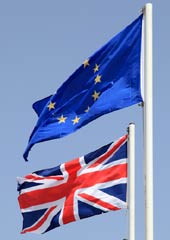The Rise of the “Little Englanders”
Why are anti-immigration parties on the rise in much of Europe?
May 26, 2014

The British political establishment is quaking in its boots — as well it should. The anti-European Union UKIP, which stands for U.K. Independence Party, just finished ahead of both Labour and the Conservatives in a nationwide election in the May 25 elections to the European Parliament. No party has achieved that feat since 1908.
Meanwhile, in France, the Front National also beat the two biggest parties to become France’s biggest party in the EU parliament.
All of this is generally made out to be a protest vote against Brussels and its “foreign” bureaucrats — because they are supposedly aloof and stand in the way of the people in each country having their way.
That proposition, of course, is entirely false, but it serves a very convenient political purpose. It allows each country’s financial elites to escape from the area of focus, by allowing the blame for the people’s current sense of unease to be deflected on that global punching bag, the EU.
The EU and the “little” people
Sure, the EU has its faults and shortcomings. So does the European Commission. But by and large, the latter does actually serve the interests of the European people — indeed, Europe’s “little” people — the little Englanders, the little Frenchies, the little Germans, and so on — who oppose integration with the world beyond their respective national borders.
Consumer protection, for example, is a business of the people that is pursued with great earnest by Brussels. If anything, big and/or global corporations are often rather incensed about the bite that the Brussels “eurocrats” exhibit.
It isn’t just Google that feels the pain of the Eurocrats trying to establish a level playing field. In that endeavor, the EU is years ahead of the United States, which remains largely in the pocket of corporations.
Being instrumentalized
What is clearly distasteful about those right-wing parties is that they are anti-immigrant, whether openly or by clever obfuscation. But they must realize at some point that, if they continue to push that particular agenda, they are themselves being instrumentalized in the larger political process by forces larger than them — the elites.
How so? Well, it’s really simple. The pain that the wider population feels is not really due to immigrants — or of the EU opening the floodgates to cross-border migration.
The UKIP’s Nigel Farage likes to make that point, in an electoral effort to blame Brussels. However, just around one-third of the UK’s immigrant population hails from the EU. The others are there because of a — you guessed it — sovereign decision by the British government, not because of Brussels.
The UKIP, in an effort to shake the “anti-immigrant” accusation, has tried to embrace that non-EU immigration — but only for the “right” (i.e. highly educated) kind. Everyone else, in Farage’s eyes, remains part of the problem.
Anti-immigrant or anti-establishment?
This being the 21st century, we should also all be wise enough to stay away from blaming foreigners for our own — or homemade — ills. It is absolutely true that there are significant stresses in all European societies, as is the case in the Untied States, Japan and elsewhere.
But the root cause, to a considerable extent, is related to the way in which entirely domestic economic strategies are being pursued. Look at the recent Pfizer takeover attempts of AstraZeneca to take advantage of UK tax loopholes.
This follows on the heels of Kraft’s 2012 takeover of Cadbury, that venerable Birmingham-born confection empire. The latter has now been cleverly rebranded with a European-sounding invented name, but remains headquartered in the United States.
Nobody in Brussels ever told the UK government that it should be busying itself with selling off the nation’s top industrial corporations, one after another. That was entirely the doing of London elites, in finance, law, accounting, consulting, PR and the media.
For the latter, any such transaction provides somebody with handsome transaction fees — which can then be reinvested by putting those profits into one’s stock accounts, probably to buy shares of the acquiring company.
The Piketty cycle
The cycle that is making the people at large mad is precisely the “Piketty cycle” — which can also be stated somewhat simpler as follows: Some people simply have got the game sewn up in such a manner that they are getting further ahead all the time, while the entire rest is, at best, treading in place.
Against this backdrop, it is important to realize that the true — and appreciable — political and economic root of the protest parties lies in their (entirely comprehensible) anti-establishment bias. It is high time for the people at large — and their self-acclaimed leaders — to stop making the problem worse.
By putting the blame for the current malaise onto immigrants, the question about the establishment’s role, responsibility and self-dealing simply disappears from the radar. That’s is very convenient, but solves exactly nothing from the vantage point of a true democracy.
Finally, anybody who seriously suggests or hopes that a greater re-nationalization of policymaking would improve the lot of the population at large is either delusional or deceptive — or both. Vital levers to increase domestic fairness — yes, via Brussels — would be lost in the process.
If that were to be the end result, then the protest parties would end up being the ultimate fools — because they would have worsened the political situation of those whom they claim to protect.
Takeaways
The rise of Little Englanders has the British political establishment is quaking in its boots.
English conservatives misdirect anger toward the E.U. and immigrants, when neither hurt the U.K.
Putting the blame on outsiders helps the U.K.'s own establishment and elites get off scot-free.

